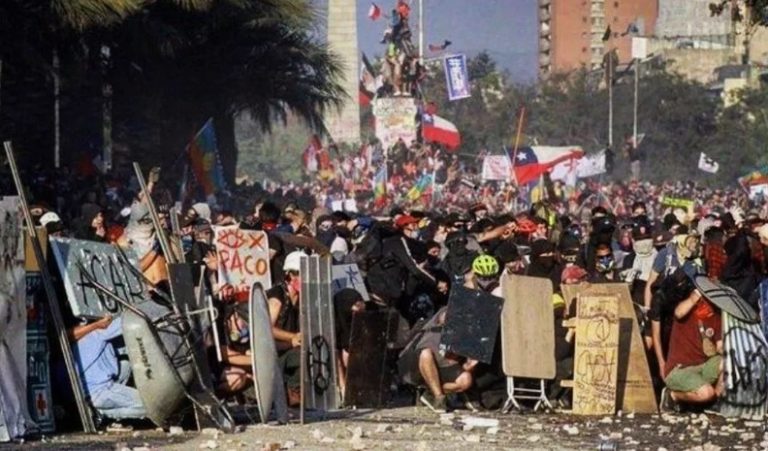What we Chileans had in October 2018 was a great social outburst. A broad and national manifestation of acute discontent that was expressed in cities, avenues and even towns all over the country. An unrest that did not hesitate to destroy temples, heritage buildings and emblematic monuments, and which was only halted by the health crisis caused by the coronavirus pandemic and its thousands of deaths. The police and the Armed Forces were not able to hold back the mobilisation of the people unless they had undertaken the most brutal repression in our history.
Revolt is what we have now afterwards with the election of Gabriel Boric as president of the Republic. A candidate who effectively had no more than 25 percent of electoral support, except in the second round where many of his opponents were practically forced to vote for the one they considered the lesser evil. Hence, the current administration lacks epicness and a clear and consensual political project. In order to be elected, the candidate had to compromise too much, put aside the fiery intentions of his party leader and, finally, agree to govern with sectors and figures he abhorred just a few months earlier. His own political reference point is made up of dozens of different denominations that, we suppose, have ideas and purposes that differ in some way. Not to mention the distance that he and other collaborators have with the Communist Party itself and with the socialists, until recently branded as social democrats.
It is because of this and many other conditions that today we are experiencing a revolt, a commotion that offers profound differences between those who govern, who are in the opposition or who await with uncertainty what may happen next. Boric’s first circle of collaborators still appears ideologically monolithic, but it is indisputable that there are already tensions among its main figures, especially among the ministers. Beyond them, the figure of the Finance Minister, a socialist renovationist or moderate who is highly questioned and who is accused of being the battering ram of big business, the right wing and the neoliberal model within the Executive, is very important. Someone who is not trusted to put up with the plethora of youngsters who hang around La Moneda, who refuse to wear a tie and walk around with their hands in their trouser pockets even in the most distinguished or republican ceremonies. Some say that Mario Marcel already regrets having left the presidency of the Central Bank, perhaps the most secure and well-paid post in the State. Especially afterwards the embarrassing result in the Chamber of Deputies with regard to his retirement bill.
The situation in the traditional parties is also in turmoil: in the former Concertación parties, dispersion reigns and severe dissonance is expressed among their parliamentarians and members of the Constituent Convention. There are still some who remain confident in the possibility of arriving at a new Constitution and there are also those who now unashamedly call themselves “yellows” who are clearly inclined to say NO to the proposal for a new Magna Carta. Hence, no one believes at this stage that we will have a new constitution with the support of more than sixty percent of the votes, which will undoubtedly consolidate the division of the country and will fuel the revolt in which we already find ourselves.
The curious thing is that division also reigns on the right and there is nothing to indicate that any common leadership can emerge from this hodgepodge of leaders. The dispersion is pathetic and it is quite possible, if Boric were to set his mind to it, that several of its leaders would end up joining the government in order to prevent “a greater evil”. Let us remember that in the past we even had right-wing Allende supporters and in Ricardo Lagos’ own term of office there were many of them who certainly believed that his administration gave rise to the best right-wing government. Even with the tweaks he made to the 1980 Pinochet Constitution to make it look like his own.
There is no doubt that in the north and in the so-called macro-south, the revolt is raging, with hundreds of immigrants entering the borders every day and being beaten and assaulted by the Chilean residents. Meanwhile, throughout the Araucanía (Wallpamu for the Minister of the Interior) new arson attacks, barricades and countless acts of violence are taking place every day. At the same time, Mapuche leaders declare that the current government remains an invalid interlocutor.
Let us leave aside, this time, the maelstrom of the constituent task. Its laudable conclusions and agreements amidst the storm of proposals without common sense or any effort to find consensus. Examples abound and are evident on a daily basis.
The worst thing is that the country’s economic situation is not promising either, according to experts from the right, centre and left. Acute inflation is affecting the most essential products and there are already many who say they are suffering from hunger due to precarious wages and unemployment. The Russian-Ukrainian war is being used as an excuse, but many know that the agricultural situation is also worsening, in addition to the terrible drought, the rising cost of inputs and the lack of planning for distributing and exporting products. Will Chile resist new rises in bread, fuel, the fateful UF and the increase in the cost of credit? Won’t all this quickly lead to unrest and more protests?
Will we have a new pandemic or another cataclysm that avoids or postpones an even sharper outbreak and convinces some people that politics must stop tinkering with the current model, such as supporting even wider gaps between rich and poor, as well as getting used to the delinquency that is already rampant throughout Chile?
Sooner rather than later, won’t we be plunged into a revolution that shatters our “institutional order”, raises a leadership and an authentic epic, a drastic and revolutionary change in method and purpose at last?












